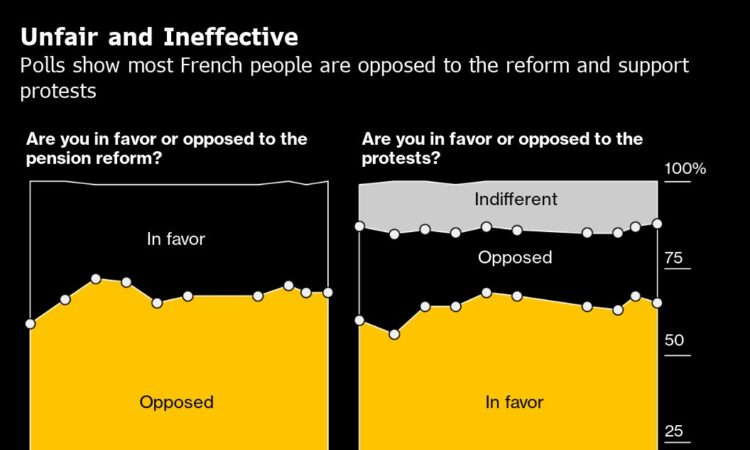
(Bloomberg) — French unions urged President Emmanuel Macron to hit the brakes on his unpopular pension reform as they held a 10th day of nationwide protests, insisting opposition remains strong even as turnout dropped and a garbage strike that has blighted the streets of Paris ends.
Most Read from Bloomberg
As concerns grow over mounting violence, labor organizations have blamed the government for creating an explosive situation. Marches last Thursday ended in chaos, with hardcore fringes clashing with riot police. Further scuffles broke out in the capital Tuesday.
The backlash against raising the minimum retirement age by two years to 64 has escalated since Prime Minister Elisabeth Borne said on March 16 that Article 49.3 of the constitution would be used to avoid a vote on the bill in the National Assembly.
Since then, there have been 114 acts of vandalism on the local offices of members of parliament, 128 cases of damage to public buildings and 2,179 arson attacks, while almost 900 police officers have been injured, according to Interior Minister Gerald Darmanin.
“Radicalized elements from the ultra left and extreme left are trying to take union marches hostage,” Darmanin told a news conference on Monday. “They come to cause damage, to injure, and to kill the police. Their aims have nothing to do with pension reform.”
The minister said an unprecedented 13,000 officers were being deployed across the country, including 5,500 in the French capital, to head off what he called a very significant risk of breaches of public order.
The police have also come under scrutiny during the protests, with unions, Amnesty International and Council of Europe Commissioner of Human Rights Dunja Mijatovic warning against excessive use of force. Darmanin said 17 internal investigations are ongoing into police behavior at the marches.
Hit Pause
Union leaders taking part in Tuesday’s marches called on Macron to hit pause on the reform, drop the age increase to 64, and allow mediation in order to resolve the dispute.
Government spokesman Olivier Veran dismissed the need for third-party involvement, however. He told reporters following a weekly cabinet meeting that the president is ready to speak directly to labor representatives once France’s Constitutional Council has ruled on the conformity of the bill. It has until April 20.
“It’s intolerable that the response is a flat refusal,” the head of the moderate CFDT union, Laurent Berger, said in comments broadcast on French TV. “Everyone can see there’s a need to calm down what’s happening and find a way out. We’ve proposed a way out.”
He added that while participation is lower than last Thursday, protesters remain determined to make Macron back down.
The portion of public-sector workers joining in walkouts fell sharply, preliminary government figures showed.
A defining image of the strikes has been the thousands of tons of trash piling up in the streets of Paris during a three-week strike by garbage collectors. However, the public services branch of the CGT union said the walkout would be suspended from Wednesday due to dwindling numbers.
For Macron, backing down would raise questions over his pledge to balance the books and spur the labor market with pro-business reforms. The French Pension Advisory Council estimated the current system could cost the public finances at least 0.5% of GDP annually over the coming decade.
However, pushing ahead by enacting the law risks a prolonged conflict and further splintering parliament, where he has already lost his absolute majority and relies on opposition lawmakers to pass texts in a conventional manner.
What Bloomberg Economics Says…
“With no clear solution in sight, Macron’s troubles underscore the difficulty of containing spending without triggering a backlash.”
“So far, activity appears to have held up well and we forecast that France escaped an economic contraction in the first quarter. But as strikes and protests continue, adding to the tightening of monetary conditions and heightened tensions in the financial sector, risks to 2Q23 are clearly to the downside.”
—Maeva Cousin, economist. For full analysis, click here
The president has attempted to appease the situation by promising to account more for workers in future reforms, including with a measure to force companies to share more of their profits when conducting share buybacks.
Borne has said she is open to talks with opposition and union leaders, and aims to avoid using Article 49.3 again for anything apart from budget bills.
Surveys regularly show French people want Macron to cancel the reform. According to an Elabe poll after he spoke on television March 22, only 24% consider him to be a good president, while 60% approve of the protests.
In what may be of greater concern to the president and his allies, a recent Ifop poll showed he’s also losing voters to Marine Le Pen’s far-right National Rally party.
–With assistance from Marie Patino, Valentine Baldassari and Caroline Connan.
(Updates with end of garbage strike from first paragraph.)
Most Read from Bloomberg Businessweek
©2023 Bloomberg L.P.






